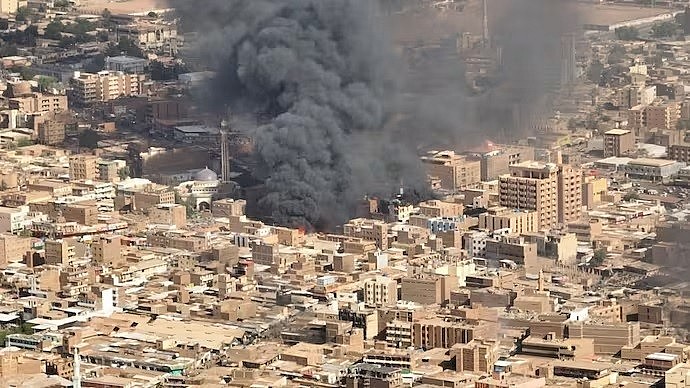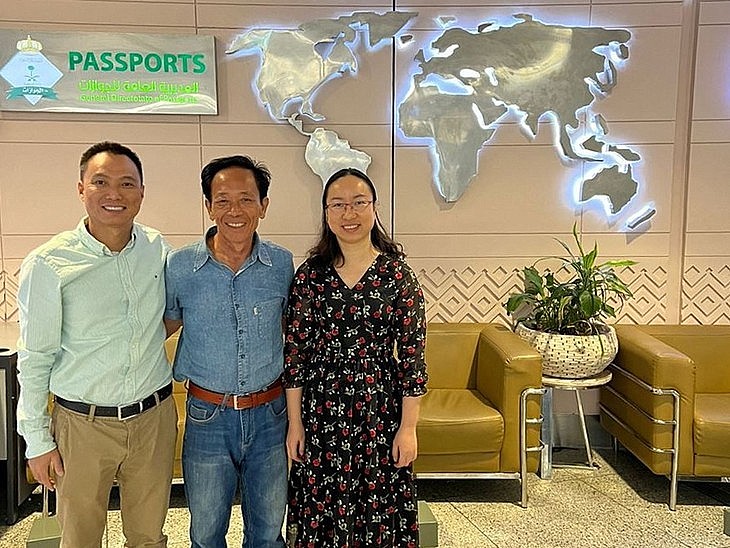 |
| The conflict in Sudan escalated, causing foreign citizens, including P.V.K., a Vietnamese citizen, to expect to be evacuated. Photo: Reuters |
On April 15, the outbreak of military conflict in Sudan left citizen P.V.K. in a difficult situation. Born in 1957 and a native of Tien Giang, Vietnam, P.V.K. held dual citizenship of Vietnam and Australia. Unfortunately, he had lost both his Vietnamese and Australian passports. In his desperate state, he expressed his wish to be evacuated with the help of the Vietnamese Embassy in Egypt, concurrently with Sudan.
of students during examinations
Exam Stress Experienced by Students
In the early days of the war, Khartoum, the capital city with an estimated population of 8 million, experienced a large-scale loss of electricity, water, phone signal, and intermittent internet connection.
Airlines announced the suspension of flights, neighboring countries decided to close the border with Sudan. Shortages of food, electricity, water, medical supplies, and fuel became extremely severe, especially in the capital and its environs. Prices of essential goods and basic services constantly increased.
The World Health Organization (WHO) has issued a warning of “high biological risk” after combatants seized a laboratory containing samples of polio, cholera and measles. The WHO has urged people to take proper safety precautions to prevent the spread of these potentially dangerous diseases.
In an effort to stay abreast of the situation, the Embassy maintained contact with K to gain insight into the circumstances and reported the matter to the relevant authorities. Simultaneously, identity verification procedures were conducted to facilitate the re-issuance of his passport.
The embassy convened an emergency meeting with the embassies of ASEAN countries in Cairo to discuss potential solutions to evacuate the citizens from the war-torn region.
Following the road to Egypt in the north, a journey of approximately 1,000 kilometers can be taken. Alternatively, travelers can reach the coastal city of Port Sudan, which is located around 800 kilometers east of the capital city of Khartoum. This city is a popular gathering point for many countries to repatriate citizens and, at the time, was still safe.
K., an Australian citizen
The Embassy also discussed with the Australian Embassy in Egypt the situation of K.K., an Australian citizen.
Australia insisted that they had information about this case and also placed the individual in need of assistance on their list. However, they did not have a financial support policy in place for those who had been evacuated.
The fighting in the capital city of Khartoum has gradually spread to other Sudanese states, resulting in a significant increase in casualties. Furthermore, Sudan’s location at the gateway to the Sahel region has only exacerbated the already precarious humanitarian situation, due to political instability and insecurity in the area.
 |
| Dual Vietnamese-Australian P.V.K. Photo: Vietnamese Embassy in Saudi Arabia |
Searching for Ways to Evacuate People Safely and Effectively
As soon as the Embassy heard that Saudi Arabia had graciously provided assistance to citizens of other countries by evacuating them by ferry across the sea from Port Sudan city to the Saudi port city of Jeddah, they swiftly raised the case of K and it was approved.
Saudi Arabia requested that K find a route to their temporary office in Port Sudan to seek help in evacuating from Sudan. However, when K and a party of Filipino citizens arrived at their destination, the Saudi Arabian government announced the cessation of ferry evacuations.
The situation in Port Sudan became ever more pressing as the number of foreign visitors increased. K remained undocumented, spending each day in a mosque. The Embassy reached out to numerous sources in a bid to uncover alternative solutions.
Fortunately, not long after, a private Sudanese airline with a representative office in Cairo re-established the Port Sudan-Jeddah route. The Embassy contacted the airline and reserved a seat for K on the earliest flight departing from Port Sudan.
With dedication, close coordination, and a commitment to protecting citizens, the Embassy worked alongside K’s family, the Ministry of Foreign Affairs, and the Vietnamese Embassy in Saudi Arabia to issue a passport using simplified procedures. Moreover, they purchased air tickets from Port Sudan to Jeddah, and then from Jeddah to Vietnam, for K.
Thanks to the Vietnamese authorities’ swift and effective measures, K was able to return to Ho Chi Minh City safely. He expressed his deep gratitude for their efforts in protecting citizens.
The story once again highlights the impressive sense of responsibility demonstrated by the Ministry of Foreign Affairs and Vietnam’s representative missions abroad in order to protect Vietnamese citizens in distress. Their proactive efforts to ensure safety and well-being are admirable and should be applauded.








